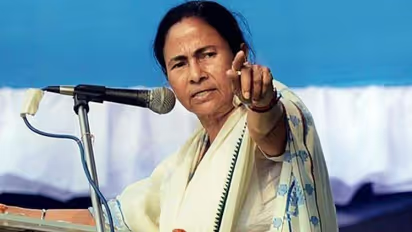
In a week from now, Bengal will host its annual extravaganza, the Bengal Global Business Summit.
Kolkata and its suburbs, which are already flooded with super-life-sized cutouts of Trinamool Congress supremo and Bengal chief minister Mamata Banerjee and her nephew Abhishek Banerjee, will see extra-lavish government spending on publicity.
Mamata will take the centerstage. His finance and commerce minister Amit Mitra will play the role of compere and keep on reminding the audience how the state became an abode of peace, investment and growth during Mamata's rule. Every sentence will begin and end with ‘at the inspiration of Mamata Banerjee’.
No one knows if he loves the music of noted qawwali singer, late Nusrat Fateh Ali Khan. But, much like Khan, Mitra’s voice too touches the highest note whenever he speaks of Mamata and investment. And at the end of the two-day summit, he will come out with a mind-blowing list of proposals worth over tens of billions of dollars.
Every newspaper editor knows that barring a few hundred crores of Chinese investment (in sectors which are facing heat in China due to environmental and other concerns), nothing really happened in the state since the exit of the Tatas from Singur in 2008.
The few visible big-ticket investments — like cement packaging unit of JSW group, Emami and so on — during Mamata’s rule were actually lined up by the previous Buddhadeb Bhattacharjee-led Left Front government.
Young men and women, both educated and uneducated, are migrating to other states in lakhs for jobs, livelihood and even for undergraduate studies. The low (and stagnant) rents for residential properties indicates not many are coming in. Job opportunities are almost non-existent beyond an annual pay packet of Rs 6-7 lakh.
Leave alone metro cities, collection of industrial taxes of Kolkata and Haldia (port city) wouldn’t match that of Surat in Gujarat and is just equivalent to Vizag in Andhra Pradesh. The economic growth of Bengal is a myth, cultivated by a politician-journalist-intellectual nexus.
After the bursting of chit funds, the media business in the state became dependent on either government largesse or advertisement of voodoo medicines. The stakes are unusually high this year as the general election is round the corner. And the media — especially vernacular newspapers and TV channels — have taken up the responsibility seriously by twisting and filtering every news item which is not palatable to the rulers.
You don’t have to visit China to know about single-party rule. Come to Bengal. It’s a little China, sans growth and prosperity. Odisha and even Assam, where normalcy returned only a few years ago, are now visibly surging ahead.
Some may like to point out consumption pattern as a mark of prosperity of Bengal. Though there is not much clue of income opportunity; flats and cars are selling. No one knows how. The only logical explanation to this question is: remittances. But it may not be the complete answer.
For nearly three years between 2010 and 2013, the industrial town of Durgapur reported the highest topline inflation of over 20%, riding primarily on real estate rent. Many smaller towns like Asansol and Malda were also in the list. The culprits were Ponzi scheme operators. The Ponzi empire crumbled in 2013. But where did the money and assets go? Who gained?
There is no legitimate answer to these questions. But evidently, Bengal politicians are no longer poor. Check out the lavish spending at Trinamool rallies; the cars their leaders, right up to the lower level, use; and you know something has changed very drastically.
The changed atmosphere will be more evident the moment you get down to business. A mid-sized company, having operations in rural areas of nearly a dozen states, including Bengal, Uttar Pradesh, Bihar, Assam and others, paid nearly Rs 10 lakh as extortion money to buy peace last year.
Ninety per cent of this extortion money was paid to ground-level leaders of the ruling Trinamool Congress in Bengal. The question of such activities by other political parties does not arise, because the police administration will not leave them an inch.
Another mid-sized business, with presence across the east, lost Rs 3 lakh in violence last year – all in the “peaceful” Bengal.
“Doing business in Bengal is getting increasingly difficult. In comparison, the much-maligned Bihar or Northeast are better,” says a businessman, who will “enthusiastically” participate in Bengal Global Business Summit on February 7 and 8.
Businesses, across India, face political pressure, buy peace at cost, and also face bouts of violence. What is exceptional about Bengal is the scale and intensity of such operations here. The entire state is divided into micro-dominions, and each such dominion is ruled by at least three rival Trinamool leaders, each running a syndicate – who will supply third-class goods at the cost of premium products; demand cut on profit, and ask for ‘chanda’ (donation) to organise social programmes to connect with voters.
Organising blood donation camps is the latest fad with them. Blood donors are lured by costly gifts like mobiles and even motorcycles. Businesses have to foot the bill. And, the pressure is rising every day. The economy is gaining, as they claim, by rise in consumption.
But, how long will this continue? Probably not very long. The number of aspiring young and educated voters is rising very fast. The politicians are now minting money by even selling a Rs 2,500 per month job at rural ICDS mother and childcare centres to graduates for Rs 3.5 lakh.
How long will people tolerate such unfair deals? How far can an illegitimate economy grow without commensurate growth of legitimate opportunities? The time bomb is ticking.